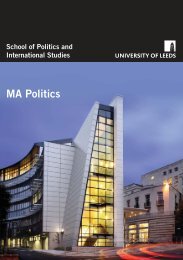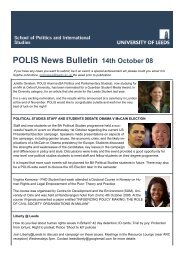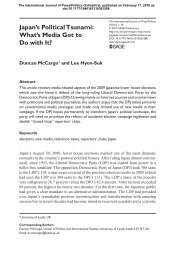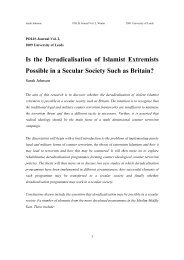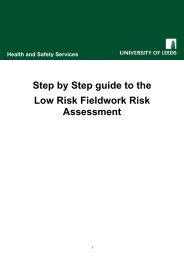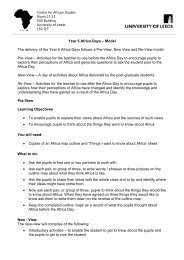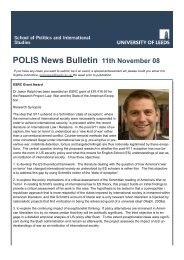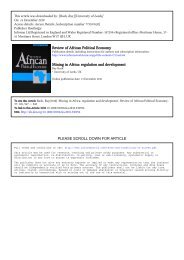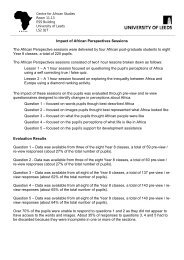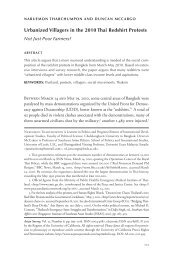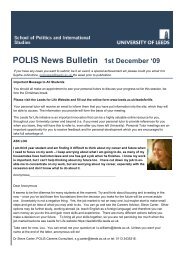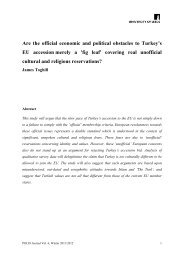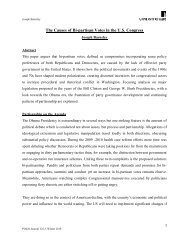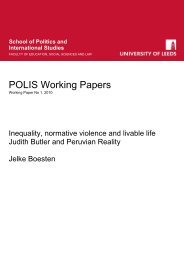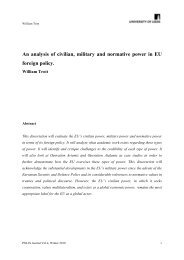Buddhism, Democracy and Identity in Thailand - Taylor & Francis ...
Buddhism, Democracy and Identity in Thailand - Taylor & Francis ...
Buddhism, Democracy and Identity in Thailand - Taylor & Francis ...
- No tags were found...
You also want an ePaper? Increase the reach of your titles
YUMPU automatically turns print PDFs into web optimized ePapers that Google loves.
160 DEMOCRATIZATIONfew Thai monks who have personal ties with Burmese counterparts go<strong>in</strong>g backdecades, <strong>and</strong> some Lao monks stay<strong>in</strong>g at temples <strong>in</strong> northeast Thail<strong>and</strong>, oftenfor purposes of study. When a delegation of n<strong>in</strong>e Thai monks went to Laos <strong>in</strong>1989 (the first such delegation s<strong>in</strong>ce 1975), their trip <strong>in</strong>voked the ire of theThai military, who regarded their visit as a threat to national security. Regionalgather<strong>in</strong>gs of Buddhist clergy tend to be sponsored by <strong>in</strong>ternational organizationsfor the discussion of social issues, rather than purely religious questions.Such gather<strong>in</strong>gs, however, <strong>in</strong>volve only those relatively small sectionsof the Thai sangha that are socially activist <strong>and</strong> <strong>in</strong>ternationalist <strong>in</strong> outlook.The sangha hierarchy often views meet<strong>in</strong>g of this k<strong>in</strong>d with suspicion,especially when they <strong>in</strong>volve Japanese, Ch<strong>in</strong>ese, Korean or Vietnamesemonks from the Mahayana tradition.<strong>Buddhism</strong> has long been a source of identity for Thai people, rather than auniversalistic religion. In this respect, Mahayana <strong>Buddhism</strong> – which supportsthe idea of an East Asian commonality – differs from the particularistic Theravadatradition. Suwanna sees the late scholar-monk Buddhadasa Bhikkhu asthe only genu<strong>in</strong>ely universalistic th<strong>in</strong>ker <strong>in</strong> recent Thai <strong>Buddhism</strong>, st<strong>and</strong><strong>in</strong>gout aga<strong>in</strong>st the dom<strong>in</strong>ant tendencies of particularism. 15 Buddhadasa (1906–1993) was the lead<strong>in</strong>g Thai Buddhist th<strong>in</strong>ker of the twentieth century, a prolificwriter <strong>and</strong> preacher who spent much of his life at Suan Mokh, a forestmonastery he founded <strong>in</strong> the southern prov<strong>in</strong>ce of Surat Thani. Buddhadasa’swrit<strong>in</strong>gs have been immensely <strong>in</strong>fluential, both <strong>in</strong>side <strong>and</strong> outside Thail<strong>and</strong>.One of his ma<strong>in</strong> themes is the need to separate the core of Buddhist teach<strong>in</strong>gs(dharma) from superstitious accretions, such as the widespread popular preoccupationwith fate (kharma). Suwanna def<strong>in</strong>es Buddhadasa core <strong>in</strong>tellectualproject thus: how can Thai <strong>Buddhism</strong> be liberated from Thai popularculture? <strong>Buddhism</strong> needs to be liberated from its cultural constra<strong>in</strong>ts beforeuniversalism becomes possible. Universalism opens up <strong>Buddhism</strong> to all,<strong>in</strong>clud<strong>in</strong>g those <strong>in</strong> the West. But it ascribes no special significance to Asia;nowhere <strong>in</strong> this writ<strong>in</strong>gs does Buddhadasa discuss the concept of Asia, oran Asian Buddhist identity. Suwanna regards <strong>Buddhism</strong> as a universalistreligion which has been improperly comm<strong>and</strong>eered by particular states <strong>and</strong>cultures to legitimate themselves.S<strong>in</strong>ce the death of Buddhadasa, Pra Dhammadipok (Prayudh Payutto)has assumed the mantle of the pre-em<strong>in</strong>ent scholar-monk of Thail<strong>and</strong>.Dhammadipok (who won the UNESCO prize for peace education <strong>in</strong> 1994)is much more of an establishment figure than Phuttathat, <strong>and</strong> one with aless universalistic outlook. Many of Dhammadipok’s books conta<strong>in</strong> theword ‘Thai’ <strong>in</strong> their titles, <strong>and</strong> explicitly contrast the positive aspects ofThai <strong>Buddhism</strong> with negative features of other cultures, especially westernculture. Examples <strong>in</strong>clude his well-known Look<strong>in</strong>g to America to SolveThail<strong>and</strong>’s Problems, 16 <strong>and</strong> more recent volumes <strong>in</strong>clud<strong>in</strong>g Thail<strong>and</strong> Will



